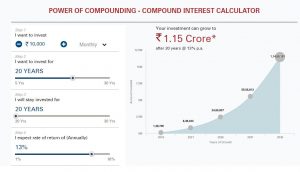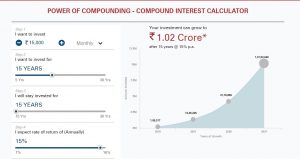Compound interest or compounding means the interest earned added to basic principal, the interest that keeps getting added to it. It essentially means reinvesting the earnings you get from your initial invested amount instead of withdrawing the interest immediately.
let’s say, you have invested Rs. 10000. Suppose you’re getting 12% interest for a year. If you invest on January 1, 2020, then by January 1, 2021, you will have Rs.1000 plus 12% interest = Rs. 1120. Instead of spending the money, you reinvest it. But for the cycle January 1, 2021-January 1, 2022, your principal amount is going to be Rs. 1120 and with 12% annual interest, by January 1, 2022, you will have Rs.1120 plus 12% interest = Rs.1269.00. If you have invested for 20 years, with compound interest, your initial investment of Rs.1000 will grow to roughly Rs. 10,890.00. This is just when you have invested Rs.1000, initially, and practically forgotten about it. This is a simple way of compounding.

Compounding with mutual funds:
In a Systematic Investment Plan(SIP) you invest a fixed sum of your savings every month (or chosen period) instead of making a big investment in a single go. Compounding is how an investment grows much more than would seem possible and why long term investing creates wealth.
The benefit of compounding is, the older an investment the more it grows over time. When you start a SIP, your oldest investment grows the most thanks to dividend additions and bonus issues (in case of growth options of equity mutual funds) as well as growth in the value of the underlying stocks or securities over time.
This way, without causing yourself a financial constraint, through compounding, you can create significant wealth by investing a little bit every month with an SIP.

What is 15*15*15 rule of a mutual fund?
The 15*15*15 rule of mutual funds means that if you invest Rs. 15,000 every month for 15 years for an annual compound interest rate of 15%, by the end of the investment period, you will have Rs. 1 crore with you against your total investment of Rs. 27 lakhs.

Why long term investment required in India:
India does not have social security like in united kingdom. Developed countries such as United kingdom provides following support to all their Legal residents for their financial support. Below financial benefits from UK government to legal residents.
- Income Support : Income Support is available for people on a low income. It is dependent on how much money a person earns and any capital or savings they have.
- Jobseeker’s Allowance : Jobseeker’s Allowance is paid to an unemployed person looking for work. It is paid to eligible people over 18 years old and under retirement age who are out of a job but capable of working and actively seeking employment.
- Child Benefit: Every one with a child under 16 living permanently in the UK can apply for Child Benefit.
- Disability Living Allowance : This is a tax-free benefit for people that who need help looking after themselves, and there are different rates which apply to the extent of the disability.
- Invalid Carer’s Allowance is a taxable benefit to help people who look after someone who is disabled. The claimant does not have to be related to, or living with, the person for whom they care for.
- State Retirement Pension : A State Retirement Pension is paid to women aged 60 and over and men aged 65 and over. The eligible age for the state pension is due to rise to 66 in the future.
India does not have social security benefits for everyone. It is citizen responsible to create wealth for retirement and kids education.
Start your mutual funds investment today with monthly 2,000 rupees for 30 years. It would grow for 30 years and you would receive 1 Crore at your retirement.
Mutual funds for long term investment(10 years and above):
Equity mutual funds is good for long term investment with 10 years and above time horizon. Mutual funds manager would select manage the portfolio and invest in equity from the fund money pool.
Axis Focused 25 Growth Direct Plan
Axis Long Term Equity Growth Direct Plan
Invesco India Opportunities Growth Direct Plan
Mirae Asset Emerging Bluechip Growth Direct Plan
SBI Small Cap Growth Direct Plan
Aditya Birla Sun Life India Gennext Growth Direct Plan
Invesco India Contra Growth Direct Plan
ICICI Prudential Banking & Financial Services Growth Direct Plan
Canara Robeco Emerging Equities Growth Direct Plan
Mirae Asset Large Cap Growth Direct Plan
Mutual funds for retirement planning(15 years and above):
Sensex and Nifty funds would be better for long term retirement planning. Index funds invested based on Sensex and Nifty chart. Compare to equity mutual funds, the expense ratio is less in index mutual funds.
HDFC Index Sensex Fund
Nippon India Index Sensex
UTI Nifty Index Fund
HDFC Index Fund Nifty 50 Plan
Tata Index Nifty Fund
ICICI Prudential Nifty Index Fund

Invest in Direct mutual funds with growth option to grow your money in compounding.
Why Mutual Fund Investment is Best in India
At age of 27, why fear to manage 7 mutual funds? It is easy…!!!
Stock Market + Experience + Low Risk + Simple = Equity mutual funds
Manage all Your mutual funds in one account. MF Aggregator Platforms







